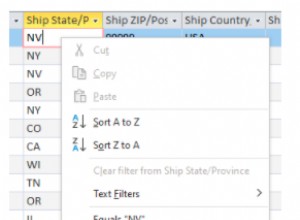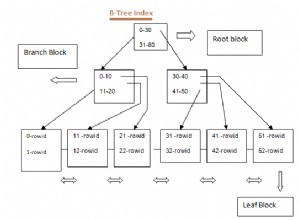Za pomocą Docker Compose
Podczas pracy z Docker Compose możesz użyć command: postgres -c option=value w swoim docker-compose.yml aby skonfigurować Postgresa.
Na przykład, to powoduje, że Postgres loguje się do pliku:
command: postgres -c logging_collector=on -c log_destination=stderr -c log_directory=/logs
Dostosowując odpowiedź Vojtecha Vitka, możesz użyć
command: postgres -c config_file=/etc/postgresql.conf
aby zmienić plik konfiguracyjny, którego użyje Postgres. Zamontowałbyś swój niestandardowy plik konfiguracyjny z woluminem:
volumes:
- ./customPostgresql.conf:/etc/postgresql.conf
Oto docker-compose.yml mojej aplikacji, pokazujący jak skonfigurować Postgres:
# Start the app using docker-compose pull && docker-compose up to make sure you have the latest image
version: '2.1'
services:
myApp:
image: registry.gitlab.com/bullbytes/myApp:latest
networks:
- myApp-network
db:
image: postgres:9.6.1
# Make Postgres log to a file.
# More on logging with Postgres: https://www.postgresql.org/docs/current/static/runtime-config-logging.html
command: postgres -c logging_collector=on -c log_destination=stderr -c log_directory=/logs
environment:
# Provide the password via an environment variable. If the variable is unset or empty, use a default password
# Explanation of this shell feature: https://unix.stackexchange.com/questions/122845/using-a-b-for-variable-assignment-in-scripts/122848#122848
- POSTGRES_PASSWORD=${POSTGRES_PASSWORD:-4WXUms893U6j4GE&Hvk3S*hqcqebFgo!vZi}
# If on a non-Linux OS, make sure you share the drive used here. Go to Docker's settings -> Shared Drives
volumes:
# Persist the data between container invocations
- postgresVolume:/var/lib/postgresql/data
- ./logs:/logs
networks:
myApp-network:
# Our application can communicate with the database using this hostname
aliases:
- postgresForMyApp
networks:
myApp-network:
driver: bridge
# Creates a named volume to persist our data. When on a non-Linux OS, the volume's data will be in the Docker VM
# (e.g., MobyLinuxVM) in /var/lib/docker/volumes/
volumes:
postgresVolume:
Zezwolenie na zapis do katalogu logów
Pamiętaj, że w systemie Linux katalog dziennika na hoście musi mieć odpowiednie uprawnienia. W przeciwnym razie otrzymasz nieco mylący błąd
KRYTYCZNY:nie można otworzyć pliku dziennika"/logs/postgresql-2017-02-04_115222.log":Odmowa uprawnień
Mówię, że wprowadza w błąd, ponieważ komunikat o błędzie sugeruje, że katalog w kontenerze ma złe uprawnienia, podczas gdy w rzeczywistości katalog na hoście nie pozwala na pisanie.
Aby to naprawić, ustawiłem odpowiednie uprawnienia na hoście za pomocą
chgroup ./logs docker && chmod 770 ./logs




